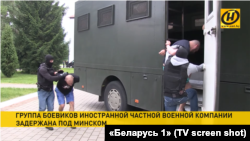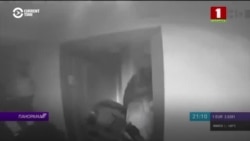Belarus’ detention of 33 alleged Russian mercenaries for supposedly planning terrorist acts to disrupt the Eastern European country’s August 9 presidential vote may have potential repercussions for the campaign of leading opposition candidate Svyatlana Tsikhanouskaya.
On July 30, the Investigative Committee, which handles Belarus’ pre-trial criminal investigations, stated that it has filed charges against jailed vlogger Syarhey Tsikhanouski, Tsikhanouskaya’s husband, for allegedly planning violent attacks against Belarusian law enforcement and “massive unrest.”
Jailed opposition member Mikola Statkevich, who opposed President Alyaksandr Lukashenka in the 2010 elections, as well as “other individuals” have also been charged.
The press release mentions the July 29 detention of 33 Russian citizens, identified as employees of the Vagner Group, a Kremlin-linked private military company, “on suspicion of committing the indicated crime.” The men, picked up at the Belarusochka sanatorium outside of Minsk and at an unspecified location in southern Belarus, have been charged with plotting to commit acts of terrorism during the election campaign.
Svyatlana Tsikhanouskaya, who began her campaign on behalf of her husband, an outspoken Lukashenka critic, after election officials refused to register his candidacy, does not appear to have yet commented publicly about the charges.
Together with representatives of fellow Lukashenka critics Viktar Babaryka, now in jail, and Valer Tsapkala, now in self-exile, she is holding a large-scale rally in Minsk’s Peoples’ Friendship park on the evening of July 30.
The Tsikhanouskaya campaign has given no indication of rethinking those plans in the wake of the detentions and government warnings about agents provocateurs.
“There are people who have decided that their goal is a change of government by any peaceful way possible, including holding new, fair elections,” campaign representative Maryya Kalesnikava commented to Current Time on July 29. “Of course, we will continue to move toward this goal.”
Doing so may now come with additional restrictions.
At a Central Election Commission meeting on July 30 with the four registered candidates opposing President Lukashenka in the August 9 ballot, Security Council Chairman Andrey Raukou, warning about potential “provocations,” alleged that some of the 33 Russian detainees had testified that they came to Belarus “to make a revolution,” candidate Andrey Dzimitryeu told RFE/RL’s Belarusian Service.
Belarus is still looking for another 170 individuals, whom it claims were working with the 33 alleged Vagner mercenaries, according to Raukou.
“It’s like a needle in a haystack,” he said of this search.
Against that backdrop, Raukou told the assembled candidates that law enforcement will take “measures to provide for the security” of participants in campaign events. Participants now must pass through metal detectors and be inspected before entering a restricted event area, candidate Hanna Kanapatskaya told RFE/RL.
Over the past month, President Lukashenka has warned Belarusian army personnel and Interior Ministry troops about the dangers of private military companies and repeatedly about supposed outside threats to Belarus’ sovereignty.
The detention of the 33 Russian citizens appears to reflect that line of reasoning.
Analysts interviewed by Current Time, however, are skeptical about the government’s allegations.
The most likely explanation for the presence of any Vagner fighters in Belarus is the country’s status as a transit hub for Russians flying to Turkey, and on to Syria and Libya, where Vagner mercenaries are active, commented Ruslan Leviyev, founder of the Conflict Intelligence Team.
Pandemic restrictions mean that Russia itself currently has no flights to Istanbul, a major airport hub for travel into the Middle East and Africa, Leviyev noted.
Although the Vagner Group, run by businessman Yevgeny Prigozhin, a close associate of Russian President Vladimir Putin, has not commented on Belarus' detentions, Leviyev expressed no doubts that the men in question were employed as mercenaries for the company.
Most of their names are already familiar from online sources “as people who fight for the Vagner Group” in Syria or Libya, and, previously, as Moscow-backed separatists in the ongoing conflict with the Ukrainian government in Ukraine’s Donbas region, Leviyev commented.
“And now, they’re going about their other business,” he said.
In a Facebook post, Russian writer Zakhar Prilepin, who has fought alongside the Donbas separatists, also recognized some of the detainees as members of his former battalion.
Ukraine’s Foreign Ministry stated on July 30 that these men’s detention reinforces its past statements about the threat of such fighters “being used in other parts of the world.”
Their presence in Belarus “confirms this fact and indicates that they can be used to destabilize the situation in Belarus on the eve of the presidential election,” it asserted.
Russia, for its part, maintains that it has insufficient official information from Belarus about the detentions. The Kremlin is awaiting the results of a discussion between its ambassador to Minsk and the Belarusian Foreign Ministry, said presidential spokesman Dmitry Peskov.
He went on to claim that he knows nothing at all about Russia’s private military companies since such corporations do not exist under Russian law.
Some observers believe that the detention of any Vagner mercenaries in Belarus, which has a mercurial relationship with Moscow, serves primarily to advance the Belarusian government’s own aims, more than to foil any potential terrorist attack. Allegations about mercenaries and armed troublemakers have occurred before ahead of Belarus' national elections.
“This is all done to sharply reduce the number of people present at [candidate] rallies, majorly knock out that protest wave because the authorities are very frightened by the scale of the rallies in support of Svyatlana Tsikhanouskaya in the regions,” charged Minsk-based political analyst Valer Karbalevich.
Independent media have estimated turnout at some of these rallies to number in the thousands.
Karbalevich, a biographer of Lukashenka, discounted speculation, however, that the president might use the detentions of the 33 alleged Russian mercenaries as grounds for introducing a state of emergency and delaying the presidential vote.
That would mean, Karbalevich said, that the country’s “tense, electrified, politicized” atmosphere would last still longer.
By contrast, he added, Lukashenka “dreams about all this finishing faster" -- and simply
returning to office for a sixth term with “80 percent” of the vote.







